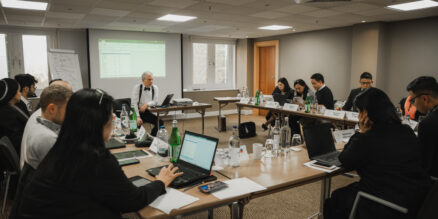Key details
Mode of delivery: Classroom-based
Course code: FM19B
Duration: 10 days
Fee: £8,325.00 + VAT
CPD Hours: 60
Course Overview
Agenda
Day — 1 Foundations of Operational Efficiency
- Foundations of Operations Management
- Aligning Operational Processes with Business Goals
- Key Principles of Resource Planning
- Integrating People, Systems & Processes for Operational Success
Day — 2 Risk Management and Performance Optimization
- Performance Optimization and Risk Management
- Identifying, Assessing, and Mitigating Operational Risks
- Implementing Effective Operational Controls
- Continuous Improvement Methodologies (Lean, Six Sigma)
Day — 3 Building Agile and Resilient Operations
- Agility and Adaptability in Operations
- Creating Operational Efficiency in a Dynamic Environment
- Managing Unexpected Disruptions and Adjusting Resources
- Case Study: Adapting Operations in a Changing Business Landscape
Day — 4 Data-Driven Operations and Governance
- Data-Driven Operations and Governance
- Creating and Utilizing Key Operational Reports
- Ensuring Effective Communication through Management Information (MI)
- Supporting Operational Decision-Making with Real-Time Insights
Day — 5 Weekly Review
- Summary and recap of key learning objectives
- Action Planning
Day — 6 Communication Fundamentals
- Understanding Workplace and Facilities Management
- Stakeholder Expectations and Facility Management Communication Plans
- Business Communications that Achieve Results
Day — 7 Leadership Strategy and Change in the Workplace and Facilities Management
- Finance & Business in the Facility Organization
- Fundamentals of Leadership & change in the workplace
- Procurement and Contract Management for the Workplace and Facilities Management
Day — 8 Occupancy & Human Factors in the Facilities Management
- Creating a safe, healthy and productive workplace experience
- Developing a Successful Employee Experience
- Workplace Experience & Organizational Culture
- Wellbeing in the Workplace
- Employee Experience
Day — 9 Occupational Health & Safety at Wellbeing at Workplace
- Legal Requirement For Health & Safety
- Role and Responsiblities of Facilities Managers to the Organization
- Health and Safety Management Systems
- Communication and Training for Health and Safety
- Promoting a Positive Health and Safety Culture
Day — 10 Course Review
- Summary and recap of key learning objectives
- Action Planning
Post-Course
- Six (6) x hour-long Executive Coaching sessions at monthly intervals following Course Completion
Target Audience
- Senior Executives with responsibility for business and operational strategy
- Chief Operating Officers (COOs) overseeing organisational efficiency and execution
- Heads of Operations leading process improvement and business performance
- Operations Managers managing daily execution, process optimisation, and risk mitigation
- Strategy Directors aligning operational processes with long-term business goals
- Facilities & Estate Managers
- Office Managers & Workplace Managers
- Specialist facilities managers and those at middle or senior management levels responsible for complex functions.
- Corporate Real Estate professional managing in-house or outsourced day-to-day operations.
- Office Managers in facilities or workplace management sectors, or those in related support services/trades, aiming to elevate their skills
- Risk and Compliance Managers ensuring regulatory compliance in operations and facilities management
- Internal Audit & Governance officers
- Health & Safety Practitioners
- Mid-to senior-level workplace experience professionals looking to master the FM competencies.
- Global FM Professionals looking to pass IFMA CFM certification exam and earn the CFM credential.
- Professionals working in the Built-Environment industry and have job functions overlooking FM related aspects.
- Process Improvement Specialists optimising workflows for efficiency and cost reduction
- Digital Transformation Managers leveraging technology to enhance operational performance
- Quality Assurance Managers maintaining operational standards and continuous improvement
- Data Analysts and Business Intelligence Professionals supporting operations with data-driven insights
Learning Outcomes
- Understand the role of operations management in achieving business goals.
- Learn how to align operational processes with overall business strategy.
- Apply key principles of resource planning for operational efficiency.
- Integrate people, systems, and processes for improved operational success.
- Maintain and improve operational quality standards.
- Identify, assess, and mitigate operational risks effectively.
- Implement operational controls to enhance efficiency and governance.
- Apply continuous improvement methodologies such as Lean and Six Sigma.
- Develop strategies for building process capacity and flexibility.
- Optimize operational efficiency in a dynamic business environment.
- Learn how to manage unexpected disruptions and adjust resources.
- Analyse real-world case studies to improve operational adaptability.
- Utilize technology to support data-driven decision-making in operations.
- Create and interpret key operational reports for better insights.
- Ensure effective communication through management information systems.
- Use real-time data to support decision-making and continuous improvement.
- Explain the core functions and strategic importance of workplace and facilities management in supporting business operations.
- Develop strategies to engage and collaborate with diverse stakeholders, including executives, employees, and vendors
- Building a successful communication strategy that aligns the total workplace experience with strategic business drivers.
- Understand financial principles and business practices essential for effective facilities management, including budgeting, cost control, and value creation.
- Apply leadership strategies to drive change, improve team performance, and manage workplace transformation initiatives effectively.
- Demonstrate the ability to manage procurement processes and vendor relationships, and ensure compliance and performance through effective contract administration.
- Appreciate the role of narratives in shaping organizations, in particular the frequent mis-alignment of the FM and the human ecology of organizations.
- Identify leadership as a process of adaptation and evolution and critically evaluate the role of idealized influences and visionary challenges in pursuing change and the role of the leader in managing the social context
- Creating processes to continually measure the effectiveness of the workplace experience and to take steps to enhance performance.
- Demonstrate skills to develop strategic plans aligned with organizational goals and objectives
- Undertake reflective exploration of your own role and the role of Facilities/ Workplace Manager in the change process and to understand the consequences of leadership on the dynamics of emergent relationships.
- Understands the legal requirements related to health and safety
- Identify workplace hazards and conduct comprehensive risk assessments.
- Implement appropriate control measures to mitigate health and safety risks.
- Effectively communicate health and safety information to employees, management, and stakeholders.
- Raising the Bar: From Operational Excellence to Strategic Impact in FM






